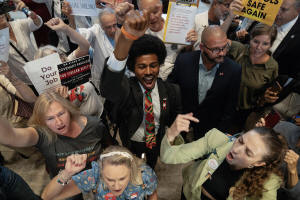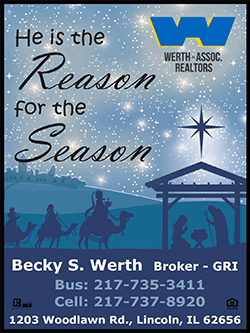How history, race and politics divide Tennessee on gun legislation
 Send a link to a friend
Send a link to a friend
 [December 29, 2023]
By Donna Bryson [December 29, 2023]
By Donna Bryson
(Reuters) - Photographs can say a lot without words. After a school
shooting in Tennessee, they recorded the frustrations of parents and
state legislators whose cries for gun control were silenced.
In one photo, it’s almost possible to hear Representative Justin
Pearson’s measured tones as he stands in prayer with one hand raised at
the Capitol following a legislative session that failed to change any
gun laws.
In March, a former student at the Covenant School in Nashville killed
three 9-year-old children and three staff members. Pearson and his
fellow Representative Justin Jones, both of whom are Black Democrats,
were briefly expelled for leading a protest for gun control on the House
of Representatives floor. A third Democrat representative, Gloria
Johnson, who is white, was not expelled for her role in the protest,
leading to accusations of racism. Republicans who overwhelmingly control
the chamber deny they are racist and oppose anything seen as a retreat
from the U.S. Constitution's Second Amendment right to "keep and bear
arms."
Cameron Sexton, the Republican who is speaker of the Tennessee House of
Representatives, did not see racism as a problem to be addressed in the
chamber.
"Sometimes people use that word (racism) as a drop the mic moment to try
to stop people from having conversations," he said.
Pearson represents Memphis, a city with a Black majority that has
struggled to contain gun violence. Pearson has lost friends and
relatives to gun violence.
“When we went to the well of the House floor, it wasn’t just the
Covenant kids that I was thinking about,” Pearson told Reuters. “I was
thinking about the people in Memphis who are mourning every day.”

Months after the protest, a special legislative session called by
Tennessee’s Republican governor ended with no progress on gun safety
laws. During the special session, Republican leaders banned members of
the public from holding signs during proceedings and limited their
access to the Capitol building. State troopers, whose presence was
increased during the session, at one point ejected members of the
public, including Covenant parents, from a hearing after a lawmaker said
the crowd was unruly.
Mary Joyce, a real estate broker whose daughter was in the Covenant
classroom where three of her classmates were killed, spoke to lawmakers
during the special session and took part in protests for gun control at
the Capitol.
"It feels like we were just screaming under water," Joyce told Reuters.
"No one could hear us."
WEIGHT OF HISTORY
Johnson said gun control advocates will continue to push for change in
the next legislative session, which opens in January.
“I always have hope. I wouldn’t be in this business if I didn’t hope
that people would listen,” said Johnson, who also is running for the
U.S. Senate. “And we know that 80% of Tennesseans want to see gun sense
legislation, 70% want red flag laws, 80% want safe storage laws. At some
point the super majority has to start listening to the people. Because
it will affect their elections.”
Jack Johnson, a Republican leader in the state Senate, said his
constituents do not support such gun control measures as red flag laws
to temporarily remove guns from individuals who might harm themselves or
others.
"Dispossessing law-abiding citizens of constitutional rights is not an
answer to our violence problem in Tennessee,” Johnson said.

[to top of second column]
|

Democratic Tennessee State Representative Justin Pearson chants with
protesters after he and other Democratic representatives walked out
of the house chamber after Democratic State Representative Justin
Jones was silenced by a procedural move during a special session on
public safety to discuss gun violence in the wake of the Covenant
School shooting, in Nashville, Tennessee, U.S., August 28, 2023.
REUTERS/Cheney Orr

Tennessee has laws to keep guns out of the hands of people involved
in domestic violence cases. Democrats and even the Republican
governor have called for broader red flag measures.
Looking at the photographs, it's almost possible to hear chants for
change that echo the soundtrack of civil rights era demonstrations.
In the 1960s, John Lewis, then a student at the American Baptist
Theological Seminary -- one of four historically Black colleges and
universities in Nashville -- was a leader in the sit-in movement
that ended racist discrimination at Nashville businesses such as a
Woolworth’s lunch counter. It was the start of a career of
challenging segregation for Lewis, who went on to represent Georgia
in the U.S. Congress and have a Nashville street named for him.
Lewis’s faith inspired him and infused his political rhetoric.
Pearson and Jones have tapped into that tradition. And deeper. Jones
read from the Bible's Book of Jeremiah – whose remonstrations fueled
the abolitionist orations of Frederick Douglass – during the
campaign for more gun control.
"Until we act, there will be no peace for the thousands of children
who came here demanding we act, who are afraid that if they’re in
school they will be gunned down because you have passed laws that
make it easier to get gun than it is to get health care in this
state,” Jones said on the House floor. He also walked the state
house hallways carrying a child's coffin, drawing attention to the
many young people affected by gun violence.
A state office building located on Representative John Lewis Way
offers another glimpse of history. When Sarah Shoop Neumann, a nurse
whose son is a Covenant student, entered the building to testify for
gun control, she was struck at the portraits of lawmakers on the
walls.
“It’s all white men,” she said. “Even in the recent years, it’s
still not that different.”
Melissa Alexander, a commercial real estate broker whose son is a
Covenant student, said, “The make-up of the legislature also needs
to be more diverse to represent the issues and constituencies, what
the constituents want in the state of Tennessee.”
Alexander along with Neumann and Joyce have organized to push for
gun control.
Slavery, segregation and violence have had an enduring impact on
race relations, not just in the South, but across the United States.

Pearson acknowledged the weight of the past. But he sees hope for a
better future.
“Not so much that we are able to see that future become a reality
even though I pray for that, but that a hundred years from now the
next kid that’s protesting that’s marching that’s fighting, they’re
fighting for something different, they’re fighting for something
new,” he said. “They hope and pray that the fight is worth it
because there is somebody, they do not know who they were, do not
know their names, who fought for them today. And that’s us."
(Reporting by Donna Bryson; Photography by Cheney Orr, Kevin Wurm
and Seth Herald; Editing by Kat Stafford and Lisa Shumaker)
[© 2023 Thomson Reuters. All rights
reserved.]This material
may not be published, broadcast, rewritten or redistributed.
Thompson Reuters is solely responsible for this content. |